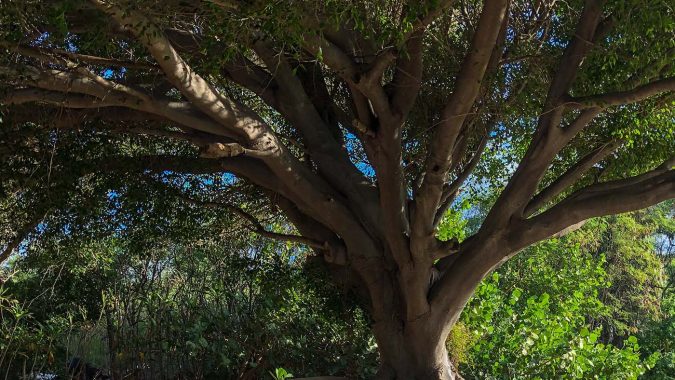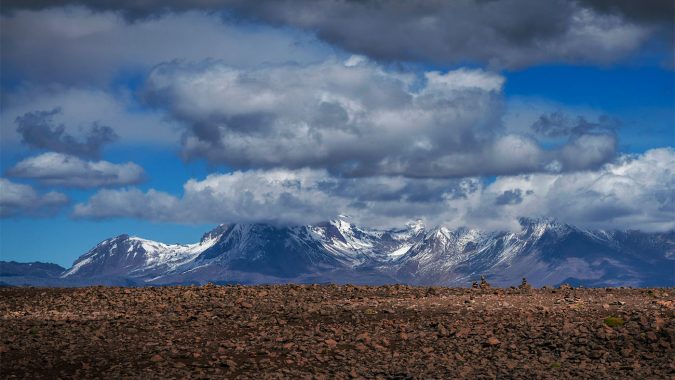
Buddhist teachings advocate vegetarianism, and the reasons begin with compassion.
All beings tremble before violence. All fear death. All love life. See yourself in others. Then whom can you hurt? What harm can you do?
Dhammapada: The Sayings of the Buddha
“Do Not Kill” is among the Five Precepts (Sanskrit: pañcaśīla) – the code of moral and ethical conduct in Buddhism. In addition, the Buddha, who upon awakening gained knowledge of how beings die and are reborn in an endless cycle (Sanskrit: saṃsāra, meaning “wandering”) taught that we’re all connected in a profound way:
There isn’t a single being, wandering in the chain of lives in endless and beginning less samsara, that has not been your mother or your sister. An individual, born as a dog, may afterwards become your father. Each and every being is like an actor playing on the stage of life. One’s flesh and the flesh of others is the same flesh. Therefore the Enlightened Ones eat no meat.
The Buddha [Angulimaliya Sutra]
Fundamentally, the lives of all sentient beings are equally valuable.
Just as the lives of human beings are precious, so are those of all living creatures. Animals have feelings, and they too experience fear and pain. They have families and loved ones and wish very much to live. When they’re about to be killed, they too cry out in terror for help. We human beings share this planet with other living creatures. How can we objectify them as food for our consumption, for us to slaughter at will?
Master Cheng Yen teaches that abstaining from eating meat can be a way to practice many aspects of the Noble Eightfold Path, which leads towards enlightenment and liberation from suffering. And, it’s a sure way to cultivate and exercise compassion:
The Buddha teaches us to “relieve the suffering of all living beings.” This includes the lives of animals. Nowadays, animals raised for meat grow up in cramped spaces. Be it cattle or hens, they live in a confined space that may not even be big enough for them to turn around in. Animals are sentient beings; living in an inhumane environment for their whole life, they harbor hatred and resentment.
We learn to be compassionate towards animals by wishing that their lives could be spared. More importantly, the act of eating meat not only involves taking a life, but allows us to become indifferent to the suffering of animals. When our heart is filled with indifference, there’s no room for compassion to grow. When we’ve nurtured compassion for animals and keep a vegetarian diet, we’re protecting life.
In fact, most of us eat meat because it’s just the way we’ve always eaten – we don’t think much about it and don’t connect the meat on our plates to a living creature that was killed for our sake. But when we begin to see the animals for the living creatures that they are, our humanity, our empathy, and our compassion will be touched. Everything then becomes very simple – that’s why children can so easily understand and become vegetarians. It’s because their hearts are very pure, so they can quickly grasp the truth that animals, like us, feel pain and don’t wish to be killed.
Master Cheng Yen also cautions us about the far-reaching karmic effect of our cruelty and lack of compassion for animals:
From Buddhism’s perspective, eating meat creates the karma of killing. There’s so much turmoil in the world. Why are there so many wars and armed conflicts in this world? An ancient saying tells us “to understand why there are wars and fighting in this world, go to the slaughterhouse and listen to the cries of animals.”
Humans kill 1,776 animals every second for food. Each day, over 150 million animals lose their lives due to the human craving for meat. In addition, millions of livestock are culled whenever there are outbreaks of livestock diseases. According to Buddhist belief, the killing of animals creates enormous collective negative karma and brings the retribution of war and suffering. If there are no such killings of animals to satisfy human cravings, the world would be at peace.
An even more urgent reason to adopt a vegetarian diet is to address the global issues we’re facing today, as Master Cheng Yen explains:
Right now, global warming, climate change, and food shortages are big issues for the world. Carbon dioxide, methane, and other greenhouse gases are causing global temperatures to rise, and a significant portion of these gases come from animal agriculture. If people switch to a vegetarian diet, less livestock will be raised, leading to a reduction in greenhouse gases created by the livestock industry.
Moreover, animals raised for meat consume a large proportion of the world’s grain and water. With the human population increasing and shortages of food in some parts of the world, grains fed to livestock could be used to feed hungry people. Hence, eating vegetarian provides a solution to some of the pressing issues we’re facing globally.
It would also help mitigate the rise in natural disasters.
In our times, we face a very difficult challenge: our planet is running a fever and global warming is bringing about extreme weather that causes devastating disasters. Yet there is something that every one of us ordinary citizens can do ourselves, and it is very simple – become vegetarian.
The Earth is our home. We want it to be a safe and peaceful place. Eating vegetarian can help achieve this. As more people in the world become vegetarians, the global temperature will be reduced, the extreme weather events we have been experiencing will also be less severe, and most of all, weather-related disasters will decrease in number. There will be less harm done to the planet. Also, with more people becoming compassionate, there will be fewer armed conflicts.
I often use the analogy of a tug-of-war between good and bad. With global warming affecting the entire human population, we must get more people to join the team on the good side of reducing greenhouse gases. To eat vegetarian is to save the Earth. If we can successfully raise awareness of the benefits associated with vegetarianism, we can inspire more people to foster a sustainable environment, to purify our air, and to protect our Earth.
Tzu Chi has been promoting vegetarianism for these reasons. In 2016, we began a campaign to promote an Ethical Eating Day, encouraging people to go vegetarian for one day on January 11. At that time the idea was that if 1,110,000 people pledged to eat vegetarian on January 11, then Tzu Chi would propose to the United Nations that January 11 be designated as Global Ethical Eating Day. Although this movement only calls for eating vegetarian on January 11, one day is not enough; we hope every person can make every day an ethical eating day.
The sections in italics consist of excerpts of material compiled into English by the Jing Si Abode English Editorial Team, based on Dharma Master Cheng Yen’s talks.
































